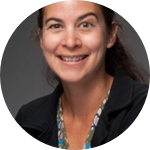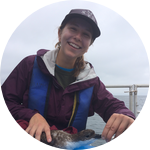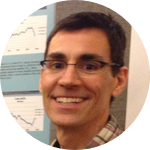About This Project
This project will characterize the microbial community structure and biodiversity of marine sediment within a national marine sanctuary. An important goal includes identifying sites with the highest potential for harboring bacteria (e.g. Streptomyces) that may contain novel biosynthetic gene clusters for natural product discovery. Metagenomics sequencing will quantify species at sites open vs. closed to fishing to inform fisheries management.
Ask the Scientists
Join The DiscussionWhat is the context of this research?
The ocean ecosystem covers more than 70% of the Earth's surface and the marine environment harbors a vast unexplored resource of microbial biodiversity. This knowledge is critical to assessing the health of the ocean's vital food web. In particular, the variety and types of species that reside at the water column and sediment interface is largely unknown. There are very large number of microbes with a virtually unexplored metabolic diversity that have had 3.5 billion years of mutations to yield high genetic variation. Breakthroughs in molecular sequencing and associated technological advances have revealed a novel “unculturable world” in which the microbial community can be examined directly from environmental samples.
What is the significance of this project?
There is a major scientific gap in the understanding of the extent to which microbial community biodiversity exists spatially across the vast geographic expanse of the marine environment. This knowledge is critical to understanding how the health and function of marine food web organisms. For example, a slight shift in the microbial communities structure can disrupt primary productivity and alter vital biogeochemical cycles that provide nutrient resources to mitigate over-fishing and pollution. Results will enable development of a procured DNA library of microbial species that will serve future novel discovery. What makes this project unique is that we are mapping the microbial diversity and screening the novel species that likely exist in a national marine sanctuary.
What are the goals of the project?
Sampling will begin with 2 major cruises in the summer and fall of 2018. The goal is to map the microbial community that live in surface sediment at benthic sites within a U.S. National Marine Sanctuary. The objectives are to characterize the microbial structure and test whether indicators of species abundance, richness and biodiversity vary in response to sites open compared to close to fishing. An additional goal is to screen for novel bacterial genomes to create novel biosynthetic gene cluster libraries with the highest potential for natural products. We will use a targeted metagenomic sequencing method to sequentially characterize small genome sized bacterial populations that reside exclusively in marine sediment habitat.
Budget
These funds will cover field site sample collection, microbial DNA extraction of sediment, molecular sequencing and bioinformatics analyses. Funds will be used for 2 cruises to collect sediment from 6 sites that differ with respect to fishing exposure ( 3 open vs. 3 closed) and depth. Vessel operating costs include logistics for 2 sampling day cruises. Molecular laboratory consumables include supplies and chemical reagents necessary to extract and isolate microbial DNA from samples. Funds will also be used to conduct DNA library preparation, sequencing, and bioinformatics, which will yield high quality genomic data to characterize taxonomy. The plan is to publish the findings in a marine ecological journal. Our team will use these never before published results to build a case for a larger-scale National Science Foundation (or similar) proposal that will build upon the ecological and conservation goals of this project.
Endorsed by
 Project Timeline
Project Timeline
We have already sampled and sequenced 2 years (summer/fall) of data from study sites open to fishing with the sanctuary. Analysis of the sequenced data has yielded interesting results thus far and we're encouraged to continue this important research. The support from the upcoming 2018 expedition will facilitate sampling from those sites open and closed to fishing. The timeline is to complete expeditions July and October 2018 as outlined by the milestones.
Jul 09, 2018
Project Launched
Jul 23, 2018
Summer expedition to collect sediment cores from sites closed and compare to those open to fishing. Extract microbial DNA to sequence samples.
Oct 04, 2018
Fall expedition to collect sediment cores from sites closed and compare to those open to fishing.Extract microbial DNA to sequence samples.
Nov 26, 2018
Bioinformatics analyses and detailed taxonomic characterization of bacterial species abundance and biodiversity of samples. Quantify bio-synthetic genes.
Dec 14, 2018
Complete project report and present results to our supporters, which will be used to submit a peer-reviewed manuscript to a molecular ecological journal.
Meet the Team
Team Bio
Our team includes an interdisciplinary group of technicians and scientists: Kent Hubbard, crew member and field project manager, Robert Valentini, MD, PhD life science executive and biotechnology science board member and Bryan Barney, PhD; Bioinformatics scientist.
John P Bucci
John Bucci is a co-founder and marine molecular scientist at Marine Microverse Institute, LLC. John's background is in biological oceanography specializing in molecular ecology of microorganisms in sediment communities. He has published original research on several projects related to sediment microbial biodiversity in U.S. coastal estuaries such as North Carolina, Washington State to New England (Bucci et al. 2014).
Additional Information
Our research team is focused on preserving the marine ecological health of the oceanic ecosystem while harnessing the advancements in molecular biology. This project will also serve on-going work to develop a novel biosynthetic gene pipeline for natural product discovery. Genomes isolated from sediment bacteria possess unique secondary metabolites necessary to develop antibiotic therapies for human health. Metagenomics provides access to microbial genomics and their function, which helps in the development of novel biocatalysts from unculturable microbial communities. For example, the genus Streptomyces may be present in abundance at our sites as key marine bacteria that contain a large reservoir of biosynthetic gene clusters that are identified using sequence screening strategies.
Project Backers
- 10Backers
- 7%Funded
- $342Total Donations
- $34.20Average Donation


